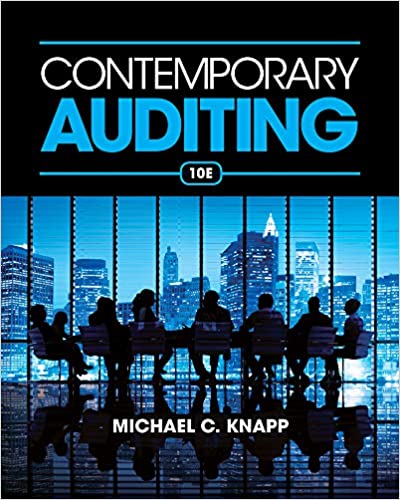
Contemporary Auditing 10th Edition by Michael Knapp
Edition 10ISBN: 978-1285066608
Contemporary Auditing 10th Edition by Michael Knapp
Edition 10ISBN: 978-1285066608 Exercise 1
Do you agree with the assertion that "intent doesn't matter" when applying accounting rules That is, should reporting entities be allowed to apply accounting rules or approved exceptions to accounting rules for the express purpose of intentionally embellishing their financial statements or related financial data Defend your answer.
Explanation
When applying accounting standards, the idea that " intent doesn't matter ," is a very aggressive interpretation. Outside (and inside) auditors are a key line of defense to assure that investors receive financial information that is clear and reliable. Investors rely on the specialized knowledge and skill of auditors, and the auditing process to identify and disclose unusual treatment of financial transactions.
The financial markets (and investors) rely heavily on a company's Board of Directors, and its auditors to mitigate any agency issues. Agency issues arise because shareholders in a company do not have any real involvement or power to be involved in the day-to-day decisions of a company. Investors put money in a company based largely on their interpretation of a company's opportunity , the ability of the company to act on an opportunity, and its progress as measured by its audited financial statements.
The idea of " anything goes as long as it is legally defensible" undermines the perceived independence of an outside auditor as well as the trustworthiness of management. Management that has an incentive to push the envelope on financial reporting or interpretation may have insufficient oversight by its Board of Directors and/or unbalanced compensation incentives.
The financial markets (and investors) rely heavily on a company's Board of Directors, and its auditors to mitigate any agency issues. Agency issues arise because shareholders in a company do not have any real involvement or power to be involved in the day-to-day decisions of a company. Investors put money in a company based largely on their interpretation of a company's opportunity , the ability of the company to act on an opportunity, and its progress as measured by its audited financial statements.
The idea of " anything goes as long as it is legally defensible" undermines the perceived independence of an outside auditor as well as the trustworthiness of management. Management that has an incentive to push the envelope on financial reporting or interpretation may have insufficient oversight by its Board of Directors and/or unbalanced compensation incentives.
Contemporary Auditing 10th Edition by Michael Knapp
Why don’t you like this exercise?
Other Minimum 8 character and maximum 255 character
Character 255


